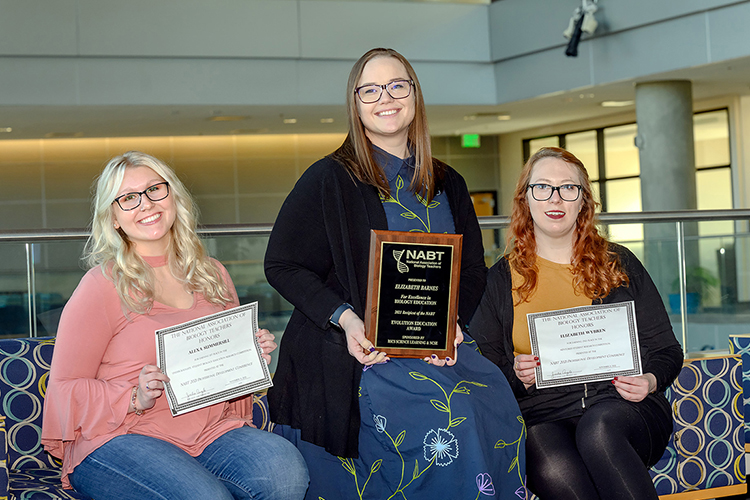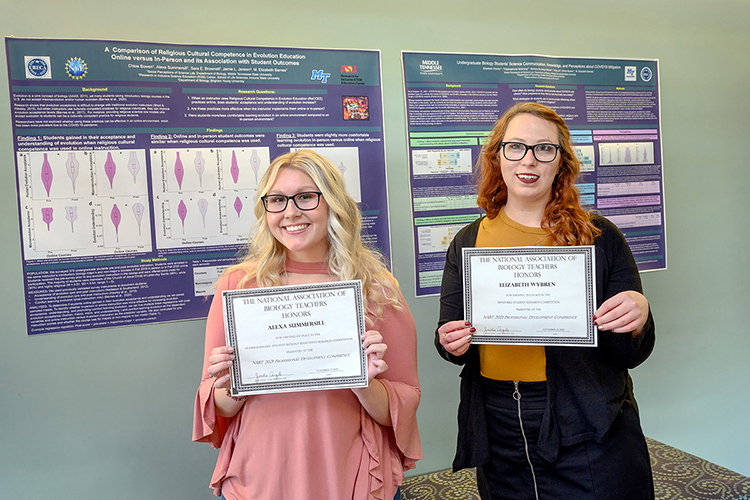The National Association of Biology Teachers has bestowed some of its top honors on an MTSU professor and two students.
Dr. Elizabeth Barnes, an assistant professor of biology, won the Evolution Education Award Nov. 14 at the NABT annual conference in Atlanta, Georgia.
Students Alexa Summersill captured first place in the organization’s Undergraduate Student Biology Education Research Competition, and Elizabeth Wybren received second place in the Mentored Student Research Competition.

Dr. Elizabeth Barnes, center, poses with students Alexa Summersill, left, and Elizabeth Wybren, right, in the Science Building with awards they received Nov. 14 at the National Association of Biology Teachers conference in Atlanta. Barnes, an assistant professor of biology, won the Evolution Education Award. Summersill and Wybren received honors for their research posters. (MTSU photo by J. Intintoli)
“To be able to look back at the beginning and where I started on reading these researchers’ papers and then 10 years later being recognized for the work that I’ve done by those researchers was really a humbling and awesome experience for me,” Barnes said.

Dr. Elizabeth Barnes
Since many Americans do not embrace Charles Darwin’s theory of evolution, Barnes gravitated toward studying evolution acceptance and rejection from a social-psychological perspective.
She created the Social Perceptions of Science Lab in the MTSU Science Building to use for examining controversial science topics.
“For example, evolution is the foundation of the entire discipline of biology,” Barnes said. “A lot of biologists say that nothing in biology makes sense unless you take into account evolution. And yet a large percentage of our students are coming into the lab not believing that this is a real thing, even though it’s such a foundational component of the science.”
Summersill, a psychology major from Smyrna, Tennessee, based her research poster on a comparison of religious cultural competence in both online and in-person evolution education.
She said she was surprised to find that students were more comfortable talking about evolution in person than in cyberspace. She also gained a new appreciation for the research process.
“I knew I would enjoy it, but I enjoy it a lot more,” Summersill said. “I’ve always hated math and statistics and all that, but I actually enjoy it more now.”
 Wybren, a biochemistry major from Manchester, Tennessee, focused on undergraduate students’ perceptions of COVID-19 and how they communicate about it.
Wybren, a biochemistry major from Manchester, Tennessee, focused on undergraduate students’ perceptions of COVID-19 and how they communicate about it.
“These students do communicate with people about COVID and topics related to COVID, but they don’t always feel very prepared,” Wybren said.
“From their instructors’ perspective, they could insert something into their lesson plans to maybe make them more aware or competent in talking about these things.”
For more information on MTSU’s biology programs in the College of Basic and Applied Sciences, go to www.mtsu.edu/biology. To learn more about the NABT, go to www.nabt.org.
You also can listen, via the SoundCloud link above, to a conversation with the trio that first aired Jan. 4 on the “MTSU On the Record” radio program on WMOT-FM Roots Radio 89.5 and www.wmot.org.
— Gina K. Logue (gina.logue@mtsu.edu)

MTSU students Alexa Summersill, left, and Elizabeth Wybren show the awards they received Nov. 14 at the National Association of Biology Teachers conference in Atlanta for their research. Their winning posters are displayed on the wall behind them in the university’s Science Building. (MTSU photo by J. Intintoli)

COMMENTS ARE OFF THIS POST